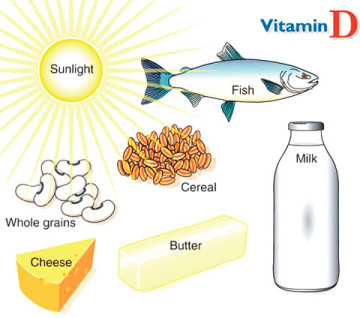Vitamin D is good, but excess can harm
in general, as humans, we need various types of vitamins in order to maintain sound health. Vitamin D is one of them.
Experts say adequate intake of this vitamin is very important if we want to maintain healthy bones and teeth. It also offers effective protection against so many diseases, including cancer, type 1 diabetes and multiple sclerosis (in which the victim may lose the ability to walk independently or at all).
Among ageing adults, physicians warn, the deficiency of this vitamin can lead to osteoporosis – that is poor bone density, weakness of the muscles and fractures.
A gynaecologist, Dr. Mary Olawuni, says when a pregnant woman is deficient in this vitamin, she could have high blood pressure (hypertension) and swelling of the face, hands, ankles and feet.
“Medically called preeclampsia, these conditions are the most common complications that can occur during a pregnancy and it generally develops during the third trimester and affects about one in every 20 pregnancies.
“If left untreated, preeclampsia can have some long-term consequences for the developing baby, as high blood pressure in an expectant mother may affect the baby’s thinking skills, the effects of which can stay with the baby for many years,” Olawuni explains.
Paediatricians say this vitamin also plays an important role in the growth and development of a child. “It strengthens the immune system and improves cardiovascular health; while some research has found that low vitamin D status in children also relates to respiratory infections and dental caries,” a paediatrician, Dr. Daniel Soremekun says.
Surgeons swear by it also. According to orthopaedic surgeon, Dr. Kingsley Chukwuemeka, when patients who have high vitamin D status undergo surgery, their healing time is higher than what is clinically obtainable among those with low Vitamin D status.
“High Vitamin D status helps to prevent complications among surgical patients; while it is also used to prevent and treat rickets (a bone disease that is unique to children and adolescents),” Chukwuemeka says.
Cancer specialists (oncologists) also add that Vitamin D is extremely important for “regulating cell growth and for cell-to-cell communication.”
According to Professor of Oncology, Remi Ajekigbe, “Some studies have suggested that the hormonally active form of vitamin D can reduce cancer progression by slowing down the growth and development of new blood vessels in cancerous tissue, while increasing cancer cell death and also reducing cell proliferation and metastases (spread of cancer cells).”
Sources of Vitamin D
In general, scientists say there are two forms of vitamin D – D2 and D3.
“Vitamin D2 is derived from fortified foods such as skim milk, fruit juice and cereals; plant foods, and supplements; while Vitamin D3 comes from fortified foods, animal foods such as chicken, sardines, mackerel, tuna, fatty fish, cod liver oil, eggs, liver; and supplements.
“It can also be manufactured internally when we absorb the ultraviolet radiation from the sun through the skin. Between 80 and 90 per cent of the body’s Vitamin D needs is derived from the sun,” the physicians say.
Experts note that though Vitamin D supplements are available, like any vitamin or mineral, it is best to obtain this important vitamin through natural sources (food and sun ray) as much as possible.
Too much of good thing
But then, as good and necessary as Vitamin D is, researchers warn that overexposure to it through sunbathing and vitamin supplements can harm!
For one, nutritionists counsel that it is better to eat a diet that contains all food groups regularly, instead of concentrating on one individual nutrient.
Consultant Nutritionist, Dr. Simeon Oladimeji, says, “Excessive consumption of vitamin D can lead to the accumulation of calcium salts in a body tissue – a situation that can disrupt normal bodily processes; and it can also lead to the hardening of blood vessels, kidney, lungs and heart – all of which can lead variously to subsequent damage to the heart, blood vessels, and kidneys.”
He adds that the most common symptoms of excessive Vitamin D in the body are headache and nausea; while it could also lead to loss of appetite, dry mouth, a metallic taste, vomiting, constipation, and diarrhoea.
Indeed, experts caution that when your bloodstream fails to get rid of excess calcium, it can end up in the arteries of the heart, brain, breasts and kidneys (as a part of kidney stones or calcium deposits in the kidneys).
Oladimeji says calcification of the arteries of the heart can lead to hypertension; while that of the breast may be an early indication of breast cancer.
He adds that Vitamin D toxicity can cause non-specific symptoms such as anorexia (eating disorder), weight loss, polyuria (a condition where you pass more urine than usual and also pass excessive or abnormally large amounts of urine each time you visit the bathroom), and heart arrhythmias (irregular heartbeat or abnormal heart rhythm, with symptoms that include palpitations, dizziness, fainting, shortness of breath and chest discomfort).
Oladimeji says no matter how much of vitamin D-rich foods you eat, you’re not likely to have Vitamin D ‘poison.’ Rather, he says, the fear of overexposure to the vitamin comes from taking dietary supplements that contain Vitamin D without doctor’s prescription.
“Long-term intakes above the upper limits increase the risk of adverse health effects over time. This is because Vitamin D supplements have the potential to interact with several types of medications, including the drugs for weight loss, cholesterol-lowering drugs, etc.,” the nutritionist says.
The bottom line
So, eat foods rich in Vitamin D, enjoy early morning sunlight, and only take Vitamin D supplements at your doctor’s discretion.
PUNCH








